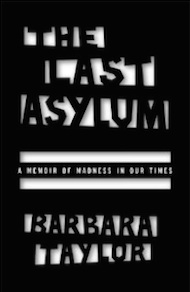By Colin Rafferty
A curious tension sits between the title and subtitle of Barbara Taylor’s memoir The Last Asylum: a Memoir of Madness in Our Times, one that suggests a necessary reconciliation of a seeming anachronism; after all, we associate “madness” and “asylums” with our concepts of how the treatment of mental illness used to be, but is thankfully no longer—the stuff of Dickens novels and Nellie Bly newspaper exposés. However, as Taylor recounts in her intense, yet uneven memoir, the asylum system existed in Great Britain until 1993, when Friern Mental Hospital—where Taylor had been a patient for several years—closed. Even more interestingly, as Taylor discusses in an afterword, the disappearance of the asylum system and its replacement by a more individually focused, self-reliant method of national health care may have caused more harm than good.
At the verge of a promising career as a historian in the late 1970s, and with a prize-winning book on early British socialism, Eve and the New Jerusalem, Taylor found herself beset upon by severe anxiety, which grew to dominate her life. She enters psychoanalysis, seeing a doctor (referred to only as “V”) five times a week, and eventually is admitted to residential psychiatric care in 1988, initially at Friern, and later at a series of day hospitals and hostels.
Authors who write about their own mental illnesses often find themselves in a bind: how can they convey the intensity and nature of their struggles while still writing a coherent, intelligible, and intelligent memoir? In Taylor’s case, her self-described madness often shows itself in the italicized dialogues between her and V, which in great detail recount both the intensity and repetition of the psychoanalytic process:
“Nothing you say makes any difference to me!
“Yet you come here every day.
“Yes—God knows why! I talk and talk, and you talk and talk, blah blah blah, and nothing makes any difference!
“What kind of difference do you want?
“I want to feel better! What do you think, you bastard? I feel awful, I feel sick.”
Taylor does not use dialogue tags to distinguish the speaker in these passages, and while telling the characters apart rarely presents a problem, it does create a sense of displacement and uncertainty in the reader, as well as, one supposes, a purposeful attempt at blurring the lines between the patient and the analyst—a kind of transference on the reader’s part.
Taylor’s description of Friern varies from the expected grotesqueries of the clichéd madhouse—one inmate is “a pale slug of a man,” another insists she is Russian royalty—but one of the more interesting aspects of Taylor’s book is her eventual recovery, which she attributes in no small part to the care and supervision she received while in the asylum system. She continues seeing V even as a patient, and other doctors and caregivers assist her. This, she argues at the book’s conclusion, was the strength of the asylum. It “was deeply flawed, but at least it recognized needs—for ongoing care, for asylum, for someone to rely upon when self-reliance is not an option.”
“Bin memoirs are a peculiar genre,” Taylor writes, and The Last Asylum is no exception. The memoir veers from the intensity of Taylor’s breakdown to soberly written histories of British mental health care and psychoanalysis. Freudian interpretations of nightmarishly hyperviolent, hypersexulized dreams share pages with rationally argued criticisms of contemporary practices, and a memoir of “madness in our times” reaches back to the seventeenth century to explain the places where Taylor finds herself. This overlap of subjects leads to a lack of focus for the book that ultimately distracts, rather than enriches.
Perhaps this is putting too much pressure on Taylor’s book. Within its covers are history and memoir, argument and analysis, a personal search and a family history, all ready to find the reader who will sit patiently with Taylor as she unwinds the complicated threads of her mind. But those who lack this patience will find themselves finally frustrated by the scattered nature of this memoir, and wish that they might, as V. does, end the session simply by saying “it’s time.”
Colin Rafferty (ΦBK, Kansas State University, 1998) teaches nonfiction writing at the University of Mary Washington in Fredericksburg, Virginia. Mary Washington is home to the Kappa of Virginia Chapter of Phi Beta Kappa.




